Virgil Brown
Strong Role Model for Family and CommunityVirgil Brown was born in Louisville, Kentucky on August 12, 1917. His mother, Sara Neighbors, and her family were long-time Kentuckians. His father was from Ohio. A minister his father knew as a young man was constantly urging him to settle down. It was the influence of this minister that brought Virgil's father to Kentucky to have dinner with the Neighbors family. It was here that Virgil's parents met and soon after married. After Virgil was born, they moved to Cincinnati Ohio where they stayed until Virgil was 12. When he was 12 years old (1929) the family moved to Cleveland and they have been here since. His father was a construction worker and there was more work in Cleveland than Cincinnati. His father worked on the old stadium and the Cleveland Hotel. As he remembers the story, his father also waited on tables at the banquet celebrating the opening of the Cleveland Hotel he helped to build. 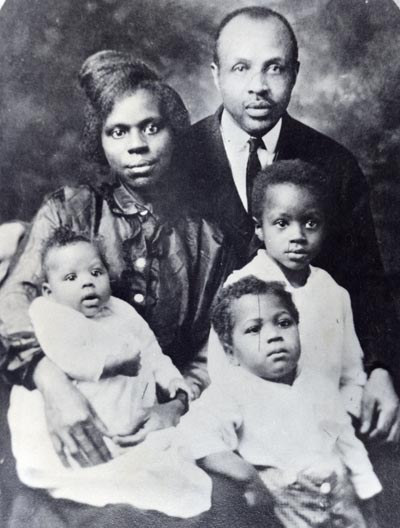
Young Virgil Brown with his parents and 2 siblings
Virgil was always amazed at young friends he met who said they had never ridden on a train. "We were always riding on trains. I was born in Louisville, my brother 2 years younger was born in Indianapolis, Indiana, my next sibling, my sister Margaret was born back in Louisville and then the next sister was born in Cincinnati a brother born in Kenton Ohio… then the last brother was born in Cleveland. There were 6 of us and we were born all over the place."There are three of the siblings living, Virgil and his two sisters, Margaret and Mary. Virgil is the only one living in Cleveland at this time. 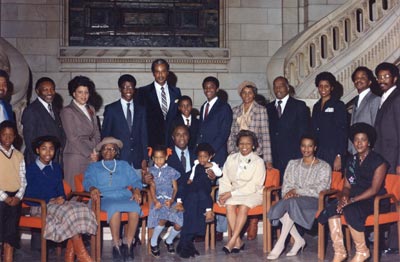
The Virgil E. Brown family
Virgil was born a sickly child. He was one of those affected by the 1917 Influenza Epidemic and was not expected to live long. His mother took the five children on a street car to what was then known as City Hospital. The doctor examined Virgil and said his problem was his tonsils - they needed to come out. "My tonsils came out and my health improved from then on. So I am very fond of that hospital… Years later, when I became County Commissioner I was a great advocate for that hospital. Whatever I could do to encourage the other commissioners to do financially, I tried. I really believe that hospital saved my life." 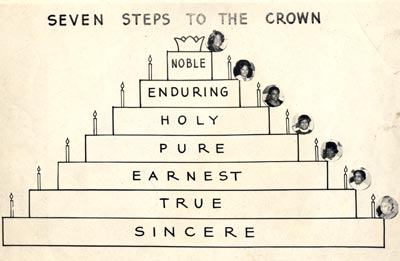
Seven Steps to the Crown that Virgil Brown learned from his mother-in-law Bessie Donald
Virgil never wanted to displease his parents. "My father because he would have given me what for and I loved my mother so much I never wanted to displease her. It would hurt me if I did anything to displease her…. I never wanted to disappoint her. Dad was a kind Christian too, but he had a low boiling point." Virgil takes after his mother. He is very quick to forgive and slow to anger. The worst thing Virgil could tell his parents would have been that he did something because the other kids were doing it. He believes, as did his parents, that everybody with a mind needs to make decisions for themselves. Virgil went to Quincy Elementary School and graduated from Central High School in 1937. He attended Fenn College (now part of CSU) at nights. He married Lurtissia (nee Spencer) and they had two children. His daughter, Veretta, is a business woman in Louisiana. Their son, Virgil Jr. has a degree in physics and law and is a practicing attorney in Cleveland as well as a member of the State School Board. They have seven grandchildren and two great grandchildren. 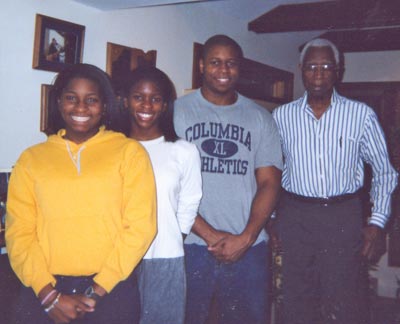
Virgil Brown with 3 of his 7 grandchildren
"We didn't have a lot to work out when we married. She was Baptist. I was Baptist. We were both Republicans. So that was about it really."He worked at Republic Steel, followed by Sherwin Williams and finally became a Supervisor for Wolfe Envelope Company "a great opportunity" At Republic Steel, Virgil worked in the coke ovens, in very high heat and dirty conditions. He was tall, thin and not very strong, but he had a great desire to work. They were actually looking for experienced men when Virgil went to apply. He was determined to find work and when he heard some of the experienced men talk about having worked at Weirton Steel, he thought this might be his ticket in. So when they asked him about his experience he told them he worked for Weirton Steel. Something made them suspicious and they asked him where the company was located. He answered "Weirton, Ohio". The problem is that the company is actually located in Weirton, West Virginia and there is no Weirton, Ohio. The foreman put him to work anyway because he could tell how much Virgil wanted to work. The first or second day on the job, Virgil got sick. The foreman told him he would not allow him to go home or to quit. He told Virgil, after he lied to get this job, he was not going to let him walk away. He sent him to the nurse who gave him salt pills and told him to lie down. Six hours later, he woke up, and it was time to go home. There were dispensers all over the work site with salt tablets in it, but he didn't know what they were. He thought he could work just from strength and drive. He found out this was not the case. "Some older men took pity on me, the next day when I went back to work, and showed me the ropes. It wasn't long before I caught on and was working hard right along with them. You learn to eat something almost every hour." He was laid off about a year later and went to work for Sherwin Williams in their linseed oil mill. He again he had to learn the work. "Plus there was a certain odor there that did not encourage you to eat, but once again you had to eat something about once an hour, like at the coke oven." Once again, Virgil was helped out by the more experienced workers at the job. Then, the job of his dreams came about and he became the Supervisor at The Wolfe Envelope Company. Every day that he was at Sherwin Williams, he read the want-ads at lunchtime. His fellow workers couldn't understand it, because Sherwin Williams was well-known for its working environment. "Everyone knew if you worked at Sherwin Williams you could go into any store and get credit, because it was year round solid work." Virgil was looking for something better, though, and one day he saw an ad for The Wolfe Envelope Company. They offered him the job, even though he received four or five dollars less per week than he was making at Sherwin Williams, because this job had room for advancement. He was started out as a Supervisor, much to the dismay of the existing employees. He had to learn the work - which he did. The very first thing he did was fire two employees that just didn't produce. "If you think firing someone is easy, it is not. I agonized over that for at least ten days and then I did it. I made a huge mistake. I fired them without due process." So they went to their Union and were re-instated. Once they came back, Virgil started the process and fired them again. This time it stuck. The entire plant was on an incentive plan - the more you produced the more you earned. The entire plant, that is, except the service department that Virgil was running. He went to the head of the plant and convinced him to include that department in the incentive program. He did, and production and profits increased immediately. Seventeen years later, when he left, he was in charge of four departments. Meanwhile, Lurtissia always maintained that he was not properly appreciated at work and that he was being taken advantage of. He read an ad for a Firestone Tire franchise and his interest was piqued. The franchise fee was $15,000.00 and the other merchandise would be on consignment. 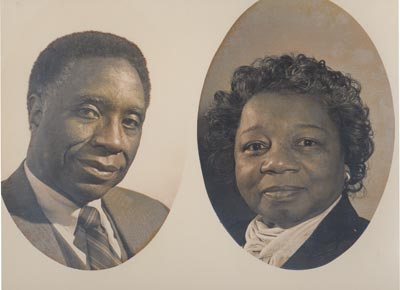
Virgil and Lurtissia Brown
His wife thought this might be a good way to be properly compensated for the work he did. She suggested they mortgage the house to finance the new enterprise. In fact, she went so far as to set up the appointment. They got a loan and opened up a Firestone Franchise at 40th and Scovill (now Community College).In less than two years, the Firestone people came to him and wanted him to add $10,000 more to the business, to carry all of the new products. Virgil was not willing to go into any more debt, so they "decided to part ways. And there I have to give my wife credit. We had an accountant who was a lawyer. We said we didn't think Firestone did right by us and we can't withstand this loss." The accountant/attorney told them they could not fight a big company like Firestone and suggested they just let it go. His wife said that was unacceptable. She planned on fighting it and threatened with the Plain Dealer and electronic media coverage to let everyone know how "they took two people who knew very little about business and misused them." By the time it was done, they were able to sell their inventory to another agent and only had to finish off the lease on the building. Virgil says he probably would have walked away and followed the accountant's advice, but his wife followed through. 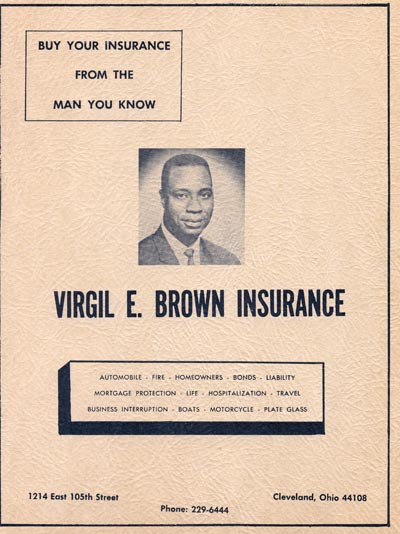
Buy your Insurance from the man you know
Virgil E Brown Insurance
It was then that he decided to get into insurance and politics. His venture into politics was the result of his wife's influence. When he first met Lurtissia, she was helping a politician pass out literature, stamping envelopes, etc. She has always been in and around politics. She worked for Harry Jaffee, Councilman Ward 25 and also W.O. Walker. When they met, she was a student at John Hay High School and worked part time for Mr. Walker, who taught her a lot about business and politics. "She was a natural as a campaigner. People liked her. She never ran for office herself but she was always helping someone." She was 15 and he was 18 when they met. Three years later, they married. They moved into what was then, Ward 25 and although she was the youngest on the block, every time there was a situation or a problem, people naturally gravitated to her for help and remedy. She knew enough to call City Hall and talk to their councilman. "Mr. Jaffee got so many calls from Mrs. Brown he decided he better stop by and see her. That's where they formed their relationship and she became the lady ward leader at a very young age and worked with Harry Jaffee." In 1966, there was what was known as "The Bed Sheet Ballot" because it was such a huge ballot. They divided the ballot into districts. The Browns were living in what was then District 41 and there was a search for someone to run in that District. Virgil went with his wife to several meetings "and of course I was ignored. They didn't know me. Didn't know anything about me. I never went to the meetings." 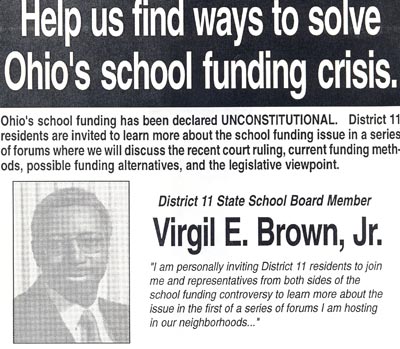
State School Board Member Virgil Brown
Virgil expressed a desire to run for the office, but as he puts it, he wasn't "the chosen one." This insulted and angered him and he decided he was going to run with or without the support of his party. He ran and won in the primary, but was defeated in the General Election. The next year (1967) he went to a meeting for Ted Williams. At the meeting, he was approached by a group of women who wanted him to run for City Council. He explained that he was a Republican and the whole ward was Democrats. They acknowledged the party difference but pledged their support anyway. 
Councilman Virgil Brown had this eyesore removed as soon as he was elected to City Council
He ran and beat the incumbent, Craft Carter. He proceeded to win 3 terms (2 years each). He entered City Council at the same time Carl Stokes was elected Mayor. Of course, Stokes was a Democrat and Brown was a Republican.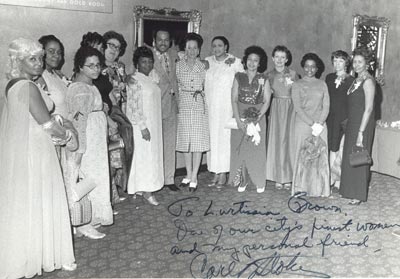
Cleveland Mayor Carl B. Stokes and Lurtissia Brown
The signature reads:
To Lurtissia Brown, One of our city's finest women and my personal friend.Carl Stokes
"It was at first very scary for me" when he looked at the numbers and county-wide he saw a more than 2/3 Democrat majority.
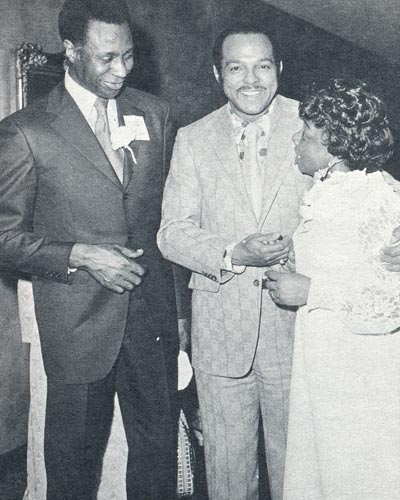
Councilman and Mrs. Virgil E. Brown with Carl Stokes at a Tribute to Stokes Affair
One of the issues of his very first election was Regionalism, and it is still being talked about today. Seth Taft was the foremost proponent of the concept. He does not believe it will happen, because the very people that need to approve it are the people who vote on it. "They would have to vote themselves out of a job, and I can't see that happening." Virgil does not want casinos coming to Ohio because he does not believe the benefits would outweigh the negatives, but he does think it will happen. 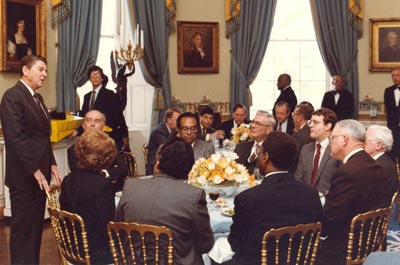
Virgil Brown and other leaders meet with President Ronald Reagan at Cleveland's Union Club
Brown acknowledges being a black Republican is not the norm and certainly, Cuyahoga County could never be confused with Republican Headquarters. "When I look back it is amazing how I survived [as a Republican] in this county all these years. "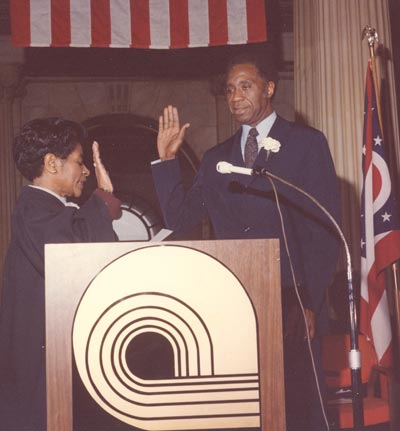
Judge Sarah Harper swears in Virgil Brown
In the middle of his 3rd term, the Cuyahoga County Board of Elections had a major breakdown. The Director resigned under fire and Virgil was appointed the Director. He served there from 1972-1979. As such, he came in contact with mayors, law directors and council people from all across the county. "I would have to say that most of my contacts were positive. I got along well. I did well. I was able to re-establish the integrity of the Board and its operations."
Virgil and Lurtissia Brown with
Janet and George Voinovich
In 1979, George Voinovich was elected mayor, which left his seat in the Commissioners Office vacant. Virgil ran for the seat and won. He ran on the full ballot in 1980-84 and 88 and won. 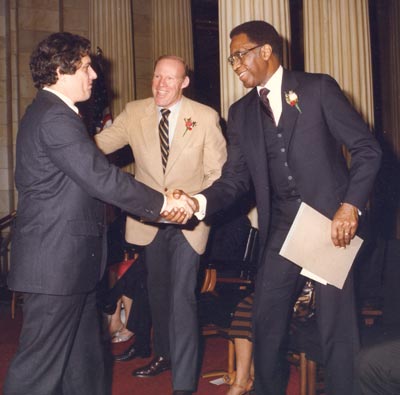
Tim Hagan, Jim Betts and Virgil Brown
He decided after his 1988 term was expiring that he did not want to run again. By this time George Voinovich was Governor, offered Virgil the position of Director of the Ohio State Lottery, and he accepted. He enjoyed the position enough to stay for four years until 1995 when he retired. Virgil acknowledges that the average black man is not Republican and he used to get angry because people asked him about that all the time. He says he didn't really have a good answer, only that his parents were. "In Kentucky, if you owned property, you could vote, so that's probably how my mother came to be a Republican." 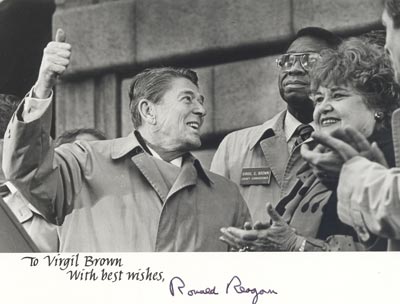
President Ronald Reagan and Virgil Brown
As he grew older, he realized he had another, better reason for being a Republican. "The idea of self reliance I guess that appealed to me. I never wanted anybody to feed my children breakfast… We always figured out a way to have breakfast…. I learned from my dad how to make an honest dollar working somewhere. I always assumed if I had my decent health that I would make it." He says the opportunities he had throughout his life were not planned, but they came to him because of other decisions he made, such as working hard. "I certainly never planned to get into politics. In fact, I didn't care for it at a young age. But that's where I wound up, and I'm glad that I did". 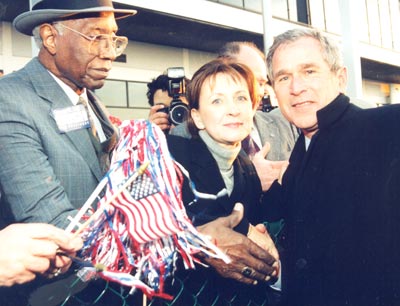
Virgil Brown and President George W. Bush
He had the opportunity to meet Presidents Nixon, Reagan and Bush. He served on the St. Lawrence Seaway Advisory Board and made the seconding speech for President Gerald Ford. 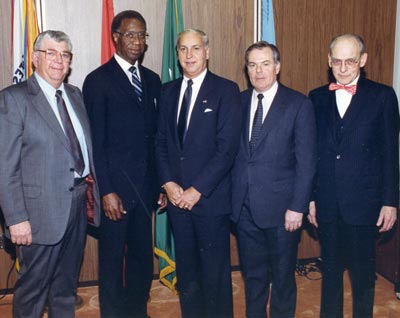
Virgil Brown on the St Lawrence Seaway Board
He thinks politics have changed a lot since he was involved. He reads about it, and is dismayed. He is still on the policy committee of the Republican Party, but he is "disillusioned". "It's not just with politics though, it's with the world. I look at the young people today and the things going on. The things that kids do now never would have crossed our minds." He says there have always been bad kids, but things seem so much worse now. 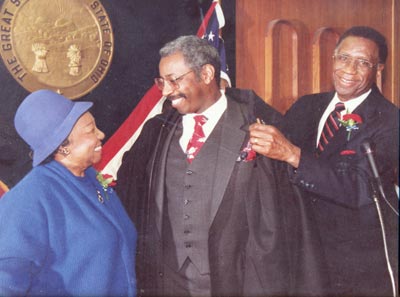
Proud Parents Virgil and Lurtissia Brown as son
Virgil E. Brown Jr. is sworn in as judge
"I would not ask anybody outside of the family to be a role model to my children. I think that a role model should come from the parents. Now I think that everyone has a responsibility to conduct themselves in such a way that they could be taken as a role model, but I would not look for a role model outside of the family"Virgil and Lurtissia are both retired now. They have done some traveling since their retirement. They have been to Paris, West Africa, Jamaica and The Canary Islands. 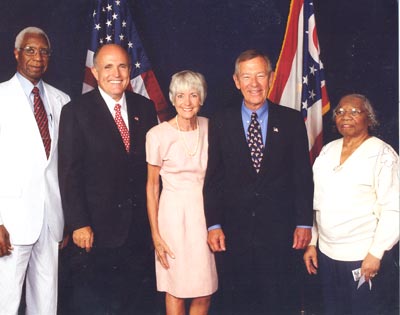
Virgil Brown, New York Mayor Rudy Giuliani, Janet and George Voinovich and Lurtissia Brown
He is an avid sports fan, having played baseball (outfield and first base) and football growing up. He quit when he says he got "too old and too slow". Then he took up bowling. He and his wife both love to bowl. He was also active in the business end of bowling as the President of the Cleveland Bowling Center and The National Bowling Association. The end of the 2007 season was the end of an amazing bowling career for Virgil. Health issues have forced him to stop. 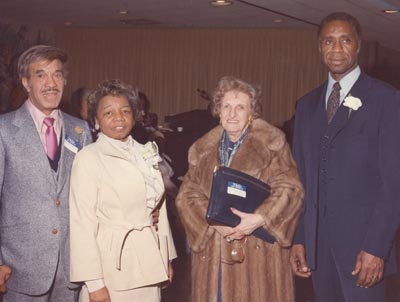
Art (of Art's Seafood) and wife
with Lurtissia and Virgil Brown
"Baseball is not now what it was when my brothers and I were growing up." He says in the summertime the sandlots would be filled with kids playing until they were called to come home. Now, he thinks more kids are playing basketball.He loves all of Cleveland's teams, but he especially likes the Cavs.
"I like Cleveland; it has been good to me and my family." His daughter is trying to convince him to move to Louisiana to be with them, but he and his wife want to stay in Cleveland. For the future, Virgil plans on enjoying his time and his family. 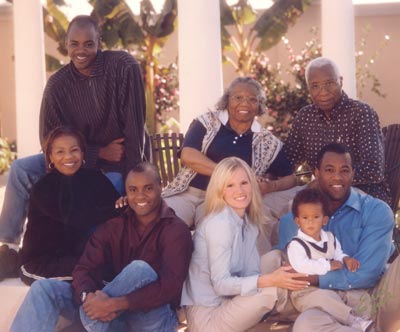
Virgil and Lurtissia Brown family
"I tell my wife that looking at our offspring we did something right. Neither one of us have any degrees. Our son and daughter have multiple degrees. I have seven grandchildren and each one has graduated from college. We're very proud of that."Virgil Brown is an all too rare breed of a man. He is a man who takes personal responsibility for every aspect of his life. Whether they were decisions he made on the job, in his personal life or his political life, he holds himself accountable and does not look to someone else to take care of him or his family. He talks about role models being the responsibility of the parents and family members, and no doubt, that is true. But anyone, family or not, who looked at Virgil Brown as a role model would not be disappointed. 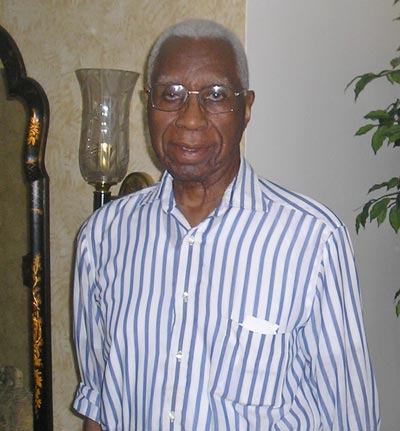
Virgil Brown at home in 2008
Strong on principles. Strong on education. Strong on family. Strong on ethics. Virgil Brown is one very strong man.
Listen to a brief (20 second) message from Virgil Brown.
Profiled by Debbie Hanson (4/08)

Update: Virgil Brown passed away Wednesday, Nov. 10, 2010 at the Cleveland Clinic at age 93. He will be missed.
Top of Page
Back to Profiles of Cleveland Seniors
| 
